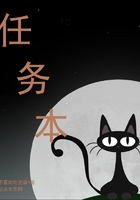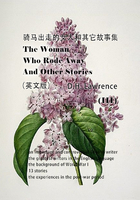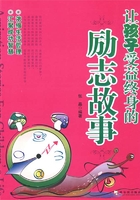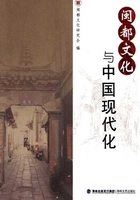For several months the old wine-grower came constantly to his wife's room at all hours of the day, without ever uttering his daughter's name, or seeing her, or making the smallest allusion to her. Madame Grandet did not leave her chamber, and daily grew worse. Nothing softened the old man; he remained unmoved, harsh, and cold as a granite rock. He continued to go and come about his business as usual;but ceased to stutter, talked less, and was more obdurate in business transactions than ever before. Often he made mistakes in adding up his figures.
"Something is going on at the Grandets," said the Grassinists and the Cruchotines.
"What has happened in the Grandet family?" became a fixed question which everybody asked everybody else at the little evening-parties of Saumur. Eugenie went to Mass escorted by Nanon. If Madame des Grassins said a few words to her on coming out of church, she answered in an evasive manner, without satisfying any curiosity. However, at the end of two months, it became impossible to hide, either from the three Cruchots or from Madame des Grassins, the fact that Eugenie was in confinement. There came a moment when all pretexts failed to explain her perpetual absence. Then, though it was impossible to discover by whom the secret had been betrayed, all the town became aware that ever since New Year's day Mademoiselle Grandet had been kept in her room without fire, on bread and water, by her father's orders, and that Nanon cooked little dainties and took them to her secretly at night.
It was even known that the young woman was not able to see or take care of her mother, except at certain times when her father was out of the house.
Grandet's conduct was severely condemned. The whole town outlawed him, so to speak; they remembered his treachery, his hard-heartedness, and they excommunicated him. When he passed along the streets, people pointed him out and muttered at him. When his daughter came down the winding street, accompanied by Nanon, on her way to Mass or Vespers, the inhabitants ran to the windows and examined with intense curiosity the bearing of the rich heiress and her countenance, which bore the impress of angelic gentleness and melancholy. Her imprisonment and the condemnation of her father were as nothing to her. Had she not a map of the world, the little bench, the garden, the angle of the wall? Did she not taste upon her lips the honey that love's kisses left there?
She was ignorant for a time that the town talked about her, just as Grandet himself was ignorant of it. Pious and pure in heart before God, her conscience and her love helped her to suffer patiently the wrath and vengeance of her father.
One deep grief silenced all others. Her mother, that gentle, tender creature, made beautiful by the light which shone from the inner to the outer as she approached the tomb,--her mother was perishing from day to day. Eugenie often reproached herself as the innocent cause of the slow, cruel malady that was wasting her away. This remorse, though her mother soothed it, bound her still closer to her love. Every morning, as soon as her father left the house, she went to the bedside of her mother, and there Nanon brought her breakfast. The poor girl, sad, and suffering through the sufferings of her mother, would turn her face to the old servant with a mute gesture, weeping, and yet not daring to speak of her cousin. It was Madame Grandet who first found courage to say,--"Where is /he/? Why does /he/ not write?"
"Let us think about him, mother, but not speak of him. You are ill--you, before all."
"All" meant "him."
"My child," said Madame Grandet, "I do not wish to live. God protects me and enables me to look with joy to the end of my misery."Every utterance of this woman was unfalteringly pious and Christian.
Sometimes, during the first months of the year, when her husband came to breakfast with her and tramped up and down the room, she would say to him a few religious words, always spoken with angelic sweetness, yet with the firmness of a woman to whom approaching death lends a courage she had lacked in life.
"Monsieur, I thank you for the interest you take in my health," she would answer when he made some commonplace inquiry; "but if you really desire to render my last moments less bitter and to ease my grief, take back your daughter: be a Christian, a husband, and a father."When he heard these words, Grandet would sit down by the bed with the air of a man who sees the rain coming and quietly gets under the shelter of a gateway till it is over. When these touching, tender, and religious supplications had all been made, he would say,--"You are rather pale to-day, my poor wife."
Absolute forgetfulness of his daughter seemed graven on his stony brow, on his closed lips. He was unmoved by the tears which flowed down the white cheeks of his unhappy wife as she listened to his meaningless answers.
"May God pardon you," she said, "even as I pardon you! You will some day stand in need of mercy."Since Madame Grandet's illness he had not dared to make use of his terrible "Ta, ta, ta, ta!" Yet, for all that, his despotic nature was not disarmed by this angel of gentleness, whose ugliness day by day decreased, driven out by the ineffable expression of moral qualities which shone upon her face. She was all soul. The spirit of prayer seemed to purify her and refine those homely features and make them luminous. Who has not seen the phenomenon of a like transfiguration on sacred faces where the habits of the soul have triumphed over the plainest features, giving them that spiritual illumination whose light comes from the purity and nobility of the inward thought? The spectacle of this transformation wrought by the struggle which consumed the last shreds of the human life of this woman, did somewhat affect the old cooper, though feebly, for his nature was of iron; if his language ceased to be contemptuous, an imperturbable silence, which saved his dignity as master of the household, took its place and ruled his conduct.















